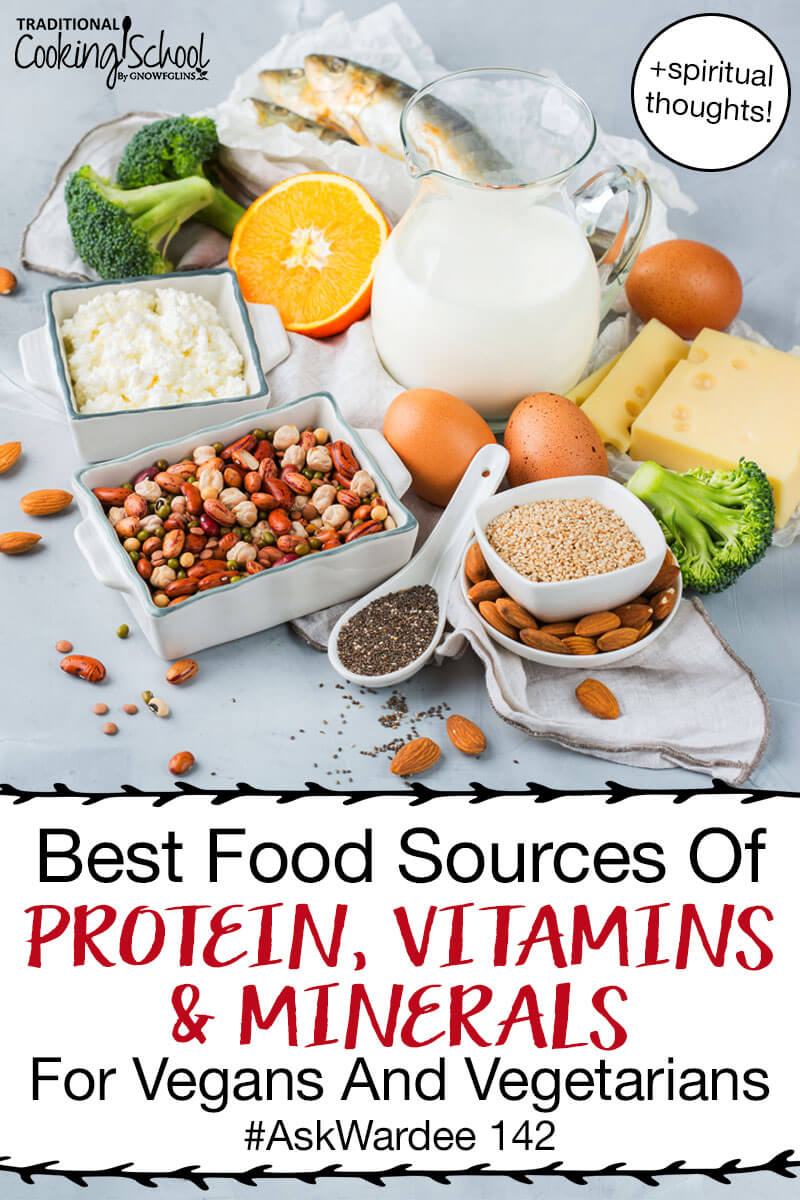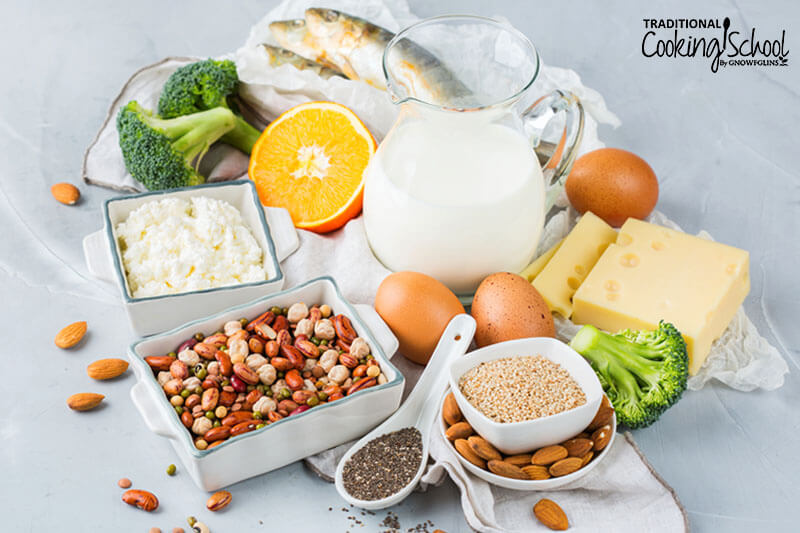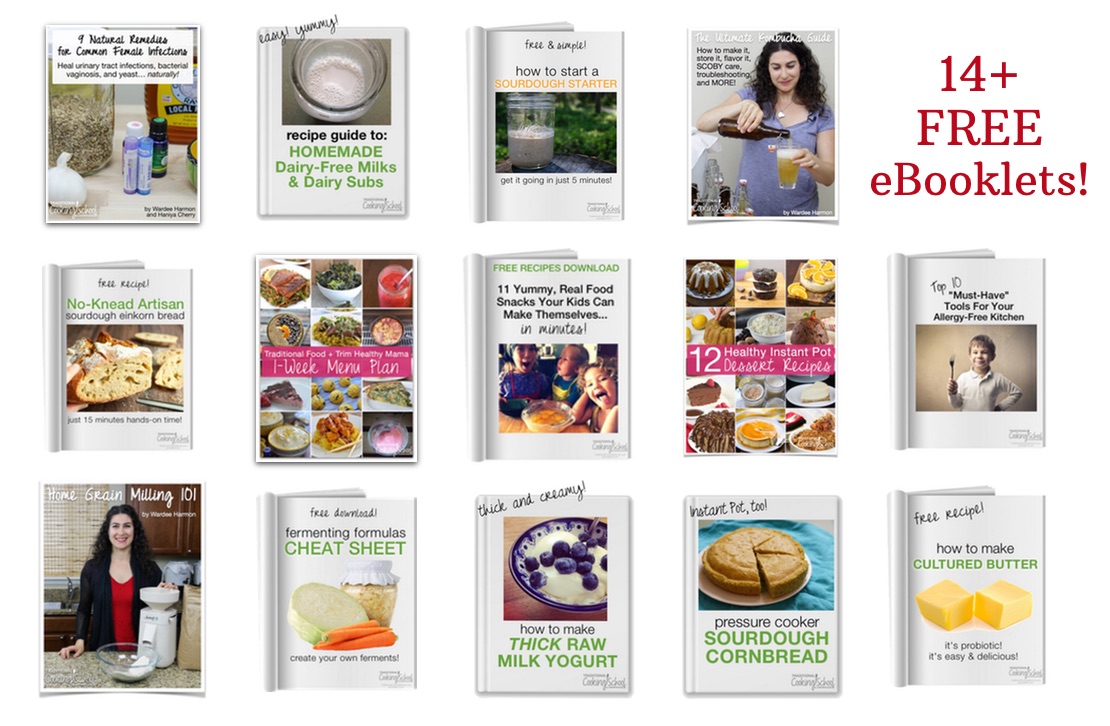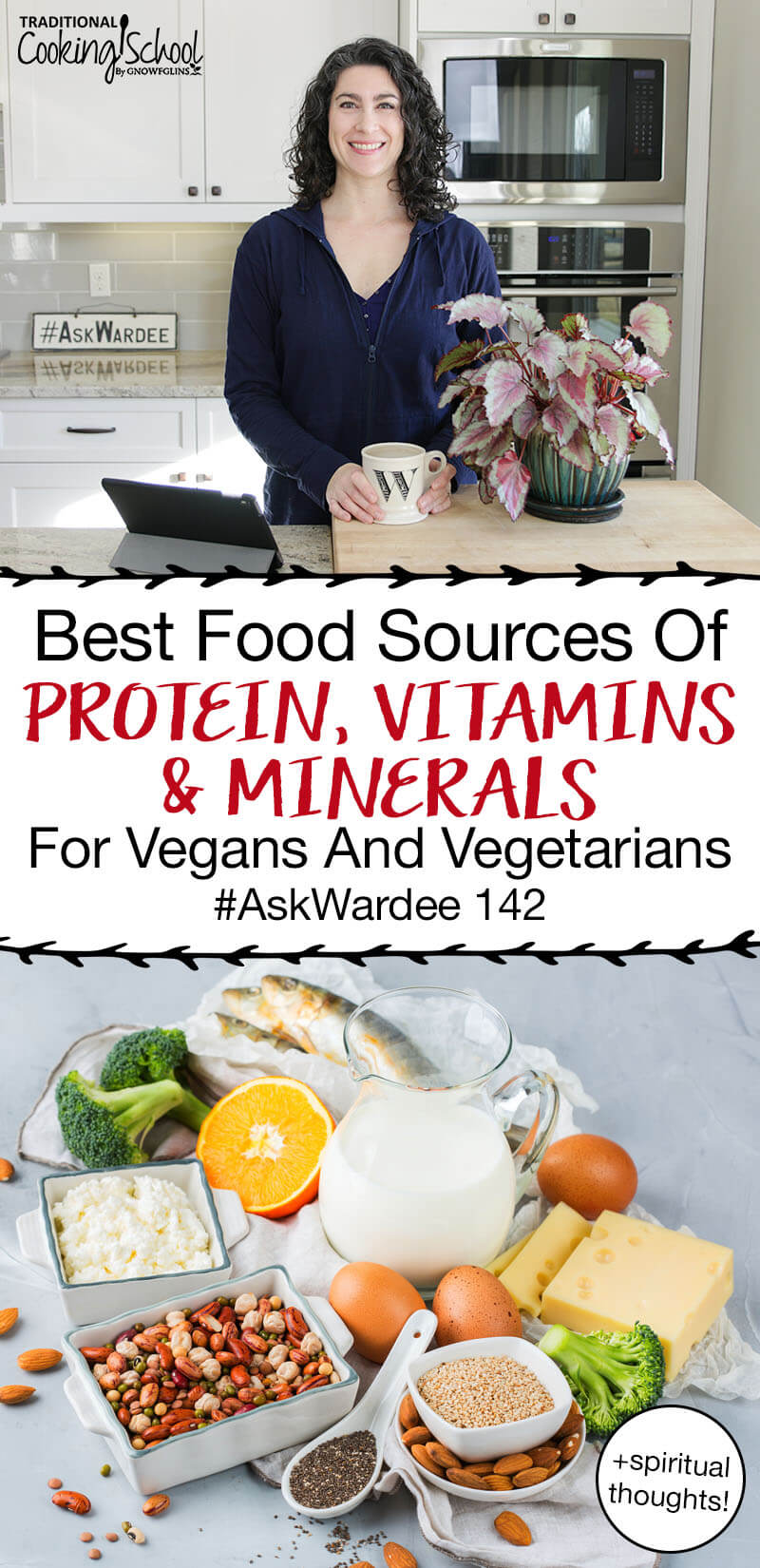Curious about plant-based diets? Let’s explore the basics of the vegan and vegetarian diets — purported benefits, rules, and why some people feel so much better when they ditch animal products. Then we’ll talk about nutritional deficiencies and the best food sources of protein, vitamins, and minerals so you can nourish your body!

“Are there other foods besides nutritional yeast to give vegetarians and vegans the vitamins, minerals, and protein that they need?” asks Terence.
I have been vegetarian in the past and our whole family was vegan for a few years, so we have extensively explored this both nutritionally and spiritually.
I’m sharing it all on today’s #AskWardee. Keep reading or watching below to learn more!
Subscribe to #AskWardee on iTunes, Stitcher, YouTube, or the Podcasts app.
Table Of Contents
The Question: Best Food Sources Of Protein, Minerals, And Vitamins For Vegetarians And Vegans
Terence B. asked:
Hello! Thank you so much for making your information available to us via the Internet. I just finished your article addressing the dangers of nutritional yeast and although I have never personally experienced an adverse reaction from monosodium glutamate, the author of this article posed some very intriguing questions and prompted me to seek further insight.
One thing that the author made very known, is that there are other foods besides nutritional yeast to give vegetarians and vegans the vitamins, minerals, and protein that they need.
I chose to become a vegetarian about 2 years ago and it has been a very satisfying lifestyle change for me. Due to my lack of knowledge, I have not replaced many nutrients and protein that comes from animal products, but rather have simply omitted those things from my diet.
I know that over time not replacing these items will cause a deficiency and possibly further health issues down the road. I would like to eat as naturally as possible, including not taking supplements. However, it is not a negotiable thing for me to return to eating meat.
So with that said, what other ways, as a vegetarian, am I able to supplement the nutritional value of nutritional yeast without compromising with monosodium glutamate? While I would prefer not to take any supplements, I am very much so open to any suggestions. Thank you so much for your time and I very much so look forward to reading your response.
Terence, thank you for your question!
Because we’re featuring your question today’s #AskWardee, you’re getting a gift — a FREE eBook and Video Package! Our team will be in contact with you so you can choose which one you’d like!
Nutritional Deficiencies In The Vegan Diet
Since your question mentions your interest in filling any voids in the vegetarian and vegan diets, let’s start by addressing the deficiencies, beginning with vegan.
The vegan diet is 100% plant-based in that no animal foods of any kind are consumed.
My family and I were vegan for a few years when our children were small. Although we initially felt pretty good, due to the cleansing power of vegetables that Dr. Natasha Campbell-McBride has discussed here, pretty soon we started feeling poorly.
Our symptoms were low energy, wasting away of muscle tissue, and we all got really skinny (not in a good way). I shared more in this past episode of #AskWardee: “Do You Need Meat To Be Healthy?”.
The “Vegan Cleanse” Effect
How to explain this initial improvement in health only to be followed by a significant downturn? Dr. Natasha Campbell-McBride shares why this happens in an article entitled “Feeding Versus Cleansing”:
Vegan diets (plant only diets) can be seen as a form of fasting. They do not feed the body properly but provide it with a lot of cleansing. While your digestive system is busy processing plant matter (so you don’t feel hungry), the diet will provide your body with large amounts of cleansing substances.
The ultimately toxic people are cancer victims; they require a lot of cleansing. That is why most nutritional cancer treatment protocols are vegan. Remember that vegan diets are only suitable for a period of cleansing. They must never be chosen as a permanent life-style.
When your body has finished cleansing it will need feeding, and that is when you have to introduce animal foods. If that is not done the body starves, starts cannibalising itself and problems start developing. … So, when talking about purely plant-based diets the word ‘diet’ should not be used, instead such a regiment should be called a Vegan Fast. (Source.)
Specific Vegan Nutritional Deficiencies
What nutrients are lacking that long-term lead to deficiencies rather than feeding? Dr. Mercola explains in “The Case Against Veganism”:
Part of the confusion is that many vegans appear quite healthy in the earlier stages. This isn’t so surprising when you consider the fact that many switch from processed foods to a mostly raw plant-based diet. The influx of live foods will undoubtedly improve your health.
However, in the long term, the absence of all animal-based foods can take a toll, as certain nutrients cannot be obtained from the plant kingdom. Carnosine, carnitine, taurine, retinol, vitamin D3, conjugated linoleic acid and long-chained omega-3 fats are examples. B12 deficiency is also very common among vegans.
After six or seven years, the B12 stored in your liver will be completely exhausted, at which point you may start to experience serious neurodegenerative diseases. There are many documented cases of blindness from B12 deficiency, as well as other neurological disorders. (Source.)
In a previous #AskWardee 011 “Do You Need Meat To Be Healthy?” I shared that a vegan diet could likely lead to deficiencies in vitamins D3 and K2, and that the vegan diet lacks the most healing foods for the human gut, animal broths and connective tissue.
Dr. Mercola also points out the dangers of not getting enough dietary protein:
…excessively low protein can become a problem for vegans — especially if your diet is also low in healthy fats. Some will get just 8 to 12 percent protein from plants in their daily diet, which can trigger muscle wasting. (Source.)
He also shares that DHA is essential for health and can be obtained only through fatty fish and marine animals such as krill:
If you have low DHA levels, it’s almost physiologically impossible to be healthy because it’s such an important part of energy generation at the molecular level. You need DHA, which is only found in fatty fish and certain other marine animals like krill. (Source.)
While our bodies can synthesize DHA from ALA (alpha-linolenic acid found present in a handful of plant foods such as chia seeds), the conversion is often poor (source) and many vegans show low blood levels of DHA (source).
What About Eating Soy Or Other Beans For Protein?
Many vegans rely on soy or soy foods like tempeh or tofu, as well as other beans, to provide dietary protein. However, as Weston A. Price Foundation’s “Soy Alert! Brochure” points out:
Like all legumes, soy beans are deficient in sulfur-containing amino acids methionine and cysteine. In addition, modern processing denatures fragile lysine.
In other words, beans are not complete proteins because they lack certain essential amino acids.
Additionally, consuming even moderate amounts of unfermented soy in one’s diet can lead to serious health problems like thyroid problems, cancer, ovulation prevention, and difficulties during menopause:
Most modern soy foods are not fermented to neutralize toxins in soybeans, and are processed in a way that denatures proteins and increases levels of carcinogens.
Soy foods can stimulate the growth of estrogen-dependent tumors and cause thyroid problems. Low thyroid function is associated with difficulties in menopause.
Soy isoflavones are phyto-endocrine disrupters. At dietary levels, they can prevent ovulation and stimulate the growth of cancer cells. Eating as little as 30 grams (about 4 tablespoons) of soy per day can result in hypothyroidism with symptoms of lethargy, constipation, weight gain and fatigue.
And there are more dangers listed right here and here.
What About Eating Peanuts For Protein?
Peanuts are a high protein nut, with 22% to 30% of calories being in the form of protein.
However, relying on peanuts for protein can lead to health problems because, as Mama Natural points out right here: “Most peanut butter contains aflatoxins or naturally occurring fungal toxins. These are metabolized by the liver, but in high doses, these toxins are considered to be a carcinogen (cancer causing).” (Source.)
In addition, peanuts are a top food allergen, making them not an option for many people.
What About Eating Soy For Vitamin B12?
Many vegans rely on soy for vitamin B12 (normally found in meat, eggs, and dairy). However, as Weston A. Price Foundation’s “Soy Alert! Brochure” points out:
The compound that resembles vitamin B12 in soy cannot be used by the human body; in fact, soy foods cause the body to require more B12.
What About Eating Nutritional Yeast For Vitamin B12?
Many who are vegan rely on nutritional yeast to supply the lacking vitamin B12 (normally found in meat, eggs, and dairy).
However, nutritional yeast comes with a danger! It actually contains MSG as a byproduct of the manufacturing process.
There are 70 adverse reactions recorded from MSG, including cardiac, gastrointestinal, and respiratory, as well as headache, dizziness, light-headedness, and loss of balance.
Terrence, you mentioned that you have already read Megan’s article on our site that shares more about this. She shares these specific reasons to avoid nutritional yeast:
- Many brands are genetically modified
- Nutritional yeast contains MSG (due to the manufacturing process)
- MSG causes serious neurological disorders
- May experience headache, dizziness, light-headedness, loss of balance
- There are 70 adverse reactions caused by MSG recorded, including cardiac, gastrointestinal and respiratory issues. (Source.)
- You may be symptom free for now, but symptoms can build slowly (bio-accumulation)
- There are better food sources for nutrients found in nutritional yeast (namely amino acids, minerals, and B vitamins)
Please note that there are over 40 different food ingredients that contain MSG as a byproduct of manufacturing… including soy protein and textured vegetable protein! (Source.)
My Conclusion About The Vegan Diet
Because a 100% plant-based vegan diet leads to nutritional deficiencies that cannot be corrected with plant foods, I personally do not recommend following a vegan diet long-term.

Nutritional Deficiencies In The Vegetarian Diet
Vegetarians have it a little better. Especially if one is a vegetarian whose metabolism thrives on carbohydrates and with lower protein needs. (According to one theory on metabolism types, about 20% of the population has this type of metabolism.)
Because vegetarians eat dairy and eggs, they are more likely to get adequate protein, fat-soluble vitamins A, D, and K2, taurine, and vitamin B12, all of which are lacking in plant foods. (However, be aware that too much Vitamin A can lead to toxicity, so we don’t recommend overdoing it either.)
Additionally, a vegetarian that eats fish (pescatarianism) is even better off due to receiving nutrition from seafood, particularly DHA as discussed earlier.
The Biggest Downside Of Following A Vegetarian Diet
If a person’s metabolism is better suited toward being fueled by fat (rather than carbohydrates) and/or has higher protein needs, it is harder (but not impossible) to create a diet around those macronutrient needs.
The tendency in a vegetarian diet is to eat more carbohydrates and while that works for those who do well on a higher-carbohydrate diet… it will be a struggle for the opposite metabolic type.
(I spoke more about metabolic types in this #AskWardee 140. Look at point #5.)
My Conclusion About The Overall Nutrition Of A Vegetarian Diet
Include dairy and eggs (and fish, if pescatarian) to provide complete protein, vitamin B12, taurine, and the essential fat-soluble vitamins A, D3, and K2. But don’t go overboard! In a vegetarian diet that lacks fish, DHA, carnitine, and carnosine may be deficient and therefore, optimal health may be hard or impossible to achieve without supplementation.
Regarding the other two amino acids I mentioned earlier that vegans cannot get from plant foods — carnosine and carnitine… eating fish ensures your body receives these as well for a more optimal, healthy diet:
- Carnosine — present in beef, chicken, and also in small quantities in certain fish in varying quantities (eel, yellowfin tuna, skipjack tuna, swordfish, and chum salmon).
- Carnitine — besides beef, chicken, and pork, all fish and shellfish contain carnitine, with cod leading the way as the big winner.
The Spiritual Perspective On Any Plant-Based Diet
After the flood, God opened up the animal kingdom as food for humans:
Every moving thing that lives shall be food for you. I have given you all things, even as the green herb. – Genesis 9:3
Our family believes God did this for a reason and that the animals provide nutrition for our bodies to be fueled (and healed) as best as possible in an otherwise fallen world.
There are studies and documentaries that claim meat is poison and such things. I agree that conventional farming DOES produce animal foods that are not good for us.
However, raising animals as God designed, on rich and diverse pastures, grows animals that are healthy and unstressed which in turn provides us with healthy food and deep nutrition. We are thankful for this, and praise God every day for providing it.
More Traditional Cooking Info…
If you eat plant foods at all, no matter if it’s a huge part of your diet, or a small part… then you need to be using Traditional Cooking methods to prepare them for best digestion because otherwise the anti-nutrients in plants (such as phytic acid, enzyme inhibitors, and lectins) can lead to nutritional deficiencies, poor gut health, and digestive troubles.
I introduce you to these methods in our FREE Traditional Cooking Video Series. And you’ll also get 14+ FREE eBooks featuring recipes, info, and articles on Traditional Cooking!
Click here to grab your 14+ free eBooks and free video series today!
Any Questions Or Comments?
If you have other questions or comments about your own experience with meeting your nutritional needs, be sure to leave them in the comments!
Helpful Links
- FREE 14+eBooks and FREE Traditional Cooking Video Series
- Why Nutritional Yeast Is NOT A Vegan Health Food
- Do You Need Meat To Be Healthy? #AskWardee 011
- Feeding Versus Cleansing by Dr. Natasha Campbell-McBride
- The Case Against Veganism by Dr. Mercola
- Soy Alert! Brochure from Weston A Price Foundation
- Soy: The Dark Side Of America’s Health Food
- Metabolic Types in point 5 of #AskWardee 140
More Informational Articles on Supplements:
- Should You Take A Multi-Vitamin Or Individual Vitamins? #AskWardee 092
- 5 Natural Supplements For Painful Periods {treatments that bring relief!}
- Do You Have A Vitamin B12 Deficiency? {symptoms & a simple solution}
- 7 Natural Ways To Boost Your Immune System +Home Remedies For Cold & Flu #AskWardee 139
- 5 Supplements To Consider Taking This Year
How do you ensure you’re getting adequate nutrition on a vegetarian diet or any other plant-based diet?
Disclaimer: I’m not a doctor. All information is intended for your general knowledge only and is not a substitute for medical advice or treatment for specific medical conditions. You are responsible for your own health and for the use of any remedies, treatments, or medications you use at home.
We only recommend products and services we wholeheartedly endorse. This post may contain special links through which we earn a small commission if you make a purchase (though your price is the same).




WOW thanks for a comprehensive coverage of vegan and vegetarian diets and the nutrients we need
No matter how humanely animals are raised, they know when they are going to slaughter & this elevates their stress hormones, which in turn are consumed by humans. Our world is fallen. I prefer the original diet God knew was best for us, introduced before sin entered into the world (plants & grains). Our family does eat honey (not vegan) We also get DHA from an algae source, which is where krill get their DHA from. Food choices take a lot of research. Thank you for all you do.